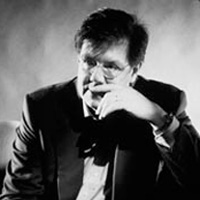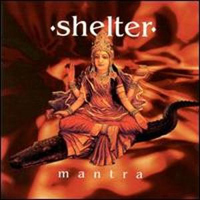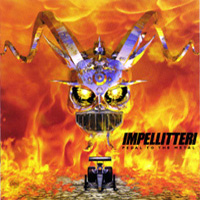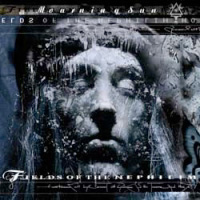 Fields of The Nephilim
Fields of The Nephilim
Mourning Sun (SPV)
An interview with singer Carl McCoy
By Ewan Wadharmi
“There were Nephilim in the earth in those days; and also after that, when the sons of /god came in unto the daughters of men, and they bare children to them, the same became mighty men which were of old, men of renown.” Genesis 6: 4
Carl McCoy is the Little Richard of Cookie Monster rock. Those guttural, otherworldly vocals your favorite Gothic/death metal/screamo band employs? He did that first. Open for business since 1983, The Fields of The Nephilim, along with Bauhaus and The Sisters of Mercy, laid the foundation for what we now call Gothic music. These ancestors operate in the shadows, like the secretive 24th Moment sect. Don’t go looking for them, if you’re worthy they’ll find you.
You’ve recorded a new record, Mourning Sun, how many of the original members are involved in it?
None of the original members. None at all.
Are you pleased with the album?
Yeah, very positive. Been getting excellent response. We have a high percentage of good reviews, which is pretty damn good. Whereas in the past, it was about 50/50, now it seems to be outweighed in the positive. So I’m quite surprised by that as well.
How does Mourning Sun differ from your previous work?
It’s part of the same journey, but it’s kind of the conclusion. People have described it to me as having all flavors, a combination of all the albums I’ve done. It’s got reflections of the past, but it’s bound to, because I’m involved in it. But it’s kind of bright and positive, looking forward. It doesn’t take you on a complete downer, I find it very uplifting. The sound of it is a bit more in your face, but it’s hard to describe your own music.
Does it surprise you that you have such a following in the U.S. after all these years?
Yeah, everything’s kind of grown. I’ve had me ups and downs with the industry over the years, but no one seems to have been put off by that. People seem more eager than ever, and the whole scene seems to have grown. So it seems the less I do, the more respect I get, which is quite nice.
 If you don’t have any output, people beg for more. No one can call you a sell-out from the way you’ve conducted your career.
If you don’t have any output, people beg for more. No one can call you a sell-out from the way you’ve conducted your career.
No, definitely not that.
You’ve always done music that you wanted to do. There’s always going to be people who want to hold on to “Moonchild,” and people who want to move on.
You’ve got to move on. That’s what it’s about. If you’re a creative person, there’s always something to be done, something to look forward to. I’ve always been like that. This is my life, it’s what I do.
This is something that you’re compelled to do?
Yeah, it’s me. It grabs me sometimes. There’s an urge to say something, and make some music. People think I’m slow to put stuff out, but I think there’s a reason to put stuff out when it’s meant to be. Not chucking any old shit out for the sake of it.
There’s an industry expectation and an audience expectation that doesn’t necessarily match anything.
From that perspective, I’ve got massive respect from the audience, because in their eyes, I haven’t actually put a foot wrong. I’m real: What you see is what you get.
Do you enjoy performing live most, or the process of songwriting? What keeps you involved in doing this?
I like the creative side of it, but the recording gets a bit tedious. I find it all boring. I like to just throw things down, but it doesn’t just sort itself all out, does it? I love playing live. It all balances out. You go into the studio for ages, and that makes you tired and weary. Then you go on the road for ages, and then you’re tired and weary. What you need is a little bit both, and I’ve never found that balance. I’m either working full on with one or the other.
Have you had any tour disasters?
We were travelling through the States last time, crossing all the time lines, and we were always late and missing dates. We did about three days in a row, just missing gigs. We’d take planes, trains, and automobiles, but get everywhere too late. Every time we turned up, the venue was shutting down. Then we were up in Canada and were gone for three days and the record company couldn’t get ahold of us.
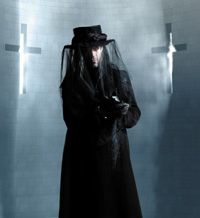 They sent out the hounds for you?
They sent out the hounds for you?
No, they didn’t, actually. We were totally out of communication with them. A few guys didn’t have their visas, so we didn’t want to cross the border or we couldn’t get back into the States. So we kind of just hid.
What are some of the bands that you currently admire?
I’ve got a mismatch of things I like. I won’t say anything, or you’ll hold me to it.
I was trying to get you to say something embarrassing like Robbie Williams or The Bee Gees.
Yeah, The Bee Gees are a big influence on The Nephilim.
Do you have any cities that you definitely have to visit in the U.S.?
The first time we came, years ago, there wasn’t a darkwave scene so much. There was a small one starting in L.A. so it was warm and sunny and bright and all these people walking around in all these dark clothes, which looked odd to me at the time. There are a lot of places I’d like to visit, but none I can think of offhand. I’d like to come back, it’s been a long time.
Well, get a passport, it’s changed.
I’ve actually got a green card.
What are you doing besides the music?
I have the visual side where I create me own artwork. It’s all connected, because it’s my lifestyle. It goes hand in hand. But now and then I have a big blowout and forget everything and go off into one for a few days with a big drink.
A little denial, and then indulgence?
Yeah, I’m pretty good with extremes. Either full on work, or… I don’t relax much. I’m not a good sleeper.
Bad dreams?
Whole life’s a big bad dream, I think. I dream in the daytime.
On the new album, what song are you most proud of?
Hard to say, because I construct my albums like it’s one big song. I find it hard to single out one song. I have a soft spot for the title track because it was the most recently written. It’s kind of refreshing. Songs change, anyway. They’re there for different emotions and moods. They work in their own way. There’s not one I don’t like, and I think that’s more important. This one seems to be strong the whole way through.
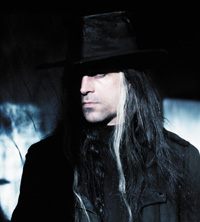 What do you think of all the bands that have copied your style?
What do you think of all the bands that have copied your style?
I’m not really aware of any. At least, I don’t really know the names of any bands that have done that. But if we’ve influenced people, that’s kind of cool, I suppose.
You started a whole genre that’s stolen your vocal style.
Well, it’s quite a natural approach for me. It’s what I do. Not a lot I can do about that.
How do you write your songs and come up with the subject matter?
I don’t really have a format for writing songs. Sometimes it’s the music, sometimes a vocal idea. Mostly, my inspiration has been quite visual. I’ve got nice pictures painted in my mind about what I want to achieve. I write my soundtrack to that, and that’s influenced by the Nephilim entity which I conduct myself through. It’s always been my inspiration.
I’m curious about that, because even before the band, I was always fascinated by the Nephilim. Can you address where that came about?
For me, it was something I learned of when I was very young. One of my parents was quite religious, so I learned about the Nephilim and The Watchers through that, much to everyone’s disgust at the time, I think. I used to call on these entities when I was young and called them “The Nephilim.” Whether it relates to the true Biblical interpretation or not, I don’t really know or care. It was my own experience and philosophy.
It’s one of those stories that gets overlooked, and if the kids do get interested in it, they just try to sweep it under the carpet.
It was pretty much like that when I was young as well. It was an area which wasn’t explained. It was kind of hushed. And being quite open-minded, people are going to dive in there. It’s like shutting a door and saying, “You can’t go in there.” So all you want to do is wait until everyone’s back is turned and run in there and have a look.
I understand you’ve been reluctant to play some of your older music live.
Reluctant? No. We’ve put quite a few albums out over the years, and obviously you can’t play everything in one show. I kind of mix and match and see what fits at the time. I play what I feel like playing at the time.
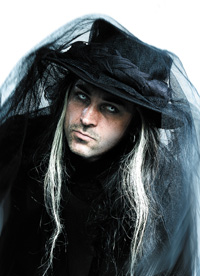 You’ve got a daughter, how does that change your life and music?
You’ve got a daughter, how does that change your life and music?
I’ve got two daughters. One of them was very young when I formed the band in 1983, so she’s quite older now. She knows more about music than meself. It kind of made me very serious about what I was doing. There’s no mucking around. The whole approach was it meant something. Everything I said and stood for, I meant. And anyone involved with it had to stand by that and back me. I was not going to give up on my dream, my goal, which I still have. There’s a journey that I need to take, and obviously, bringing a daughter into the world, you have to be serious about what you’re doing. Life’s not just a joke. It’s there for the taking. It’s been a good thing for me, it’s grounded me as well. Stopped me going too far over the edge.
Have you written songs for them specifically?
Not as such, but there are a lot of layers in the way I write, and a lot of interpretations. I dedicate my records to them. That’s all that’ll be left of me one day.
Where do you draw inspiration from?
Wherever it comes from. It’s always there. I don’t study books or bands or music anymore. I’ve got my own philosophy on things. I like spontaneous approaches, as well as the tedious, mechanical approach. Inspiration is with me, all around me. What I see, what I feel, within me, without me.
Do you try to distance yourself from the Gothic scene?
No, I don’t. It’s only a word, only a term. The basis of that scene have been the biggest buying market of my songs and records, so I wouldn’t turn my back on them. They’re the people who enable me to do what I do. The majority of that scene has changed, obviously. There’s a big commercial side to it, and also the sub-categories. But it’s not gone away, it’s expanded. To me it’s healthy. When we started out, we was part of the alternative scene, until people like us and a few others changed it into the Gothic scene. The kind of dark and self-exploratory side of it, which is good.
You were the first band that I knew to borrow Country Western into the darker stuff.
I don’t know about C&W… We used a bit of slide guitar, if that’s what you mean. Maybe the image gave that that off as well, but we just made music.
Where are you living now?
Just outside of London.
How has that changed?
London has changed drastically. It’s very hard to find a true Londoner in London. I grew up in Brixton, and it doesn’t feel like home when I go there, let’s put it that way. I don’t belong anywhere anymore.
Is there a lot of fear there now, with the terrorism London’s experienced?
I think so, but a lot of people are ignorant, and they want to get on with what they want to get on with. There’s a strength to it, I suppose, but also an ignorance. People don’t stick together in this country like they should. It’s a bit sad.
(www.spvusa.com)

